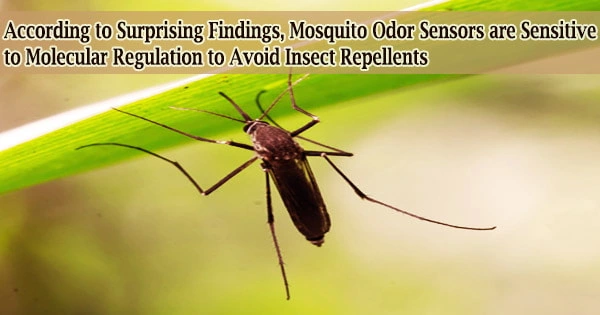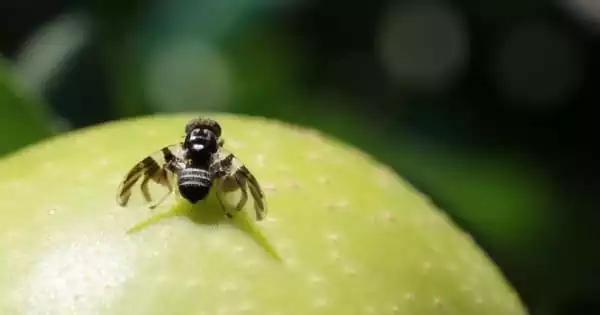Scientists from Johns Hopkins Medicine discovered that, unlike fruit flies, mosquito odor sensing neuron cells shut down when induced to create odor-related proteins or receptors, on the cell surface. The bugs appear to be able to ignore typical insect repellents thanks to this “expression” process.
When fruit flies’ olfactory sensors are pushed to express odor receptors, however, they flee from some stinky conditions.
According to the researchers, the findings, which were published in Cell Reports on March 8, demonstrate the diversity of insect olfactory systems and add to the expanding corpus of research aimed at enhancing mosquito repellent treatments on human skin.
Mosquito bites not only cause uncomfortable swelling and itching, but they also play a part in the spread of diseases such as malaria, dengue fever, and Zika virus infections around the world.
“When experiments don’t go as predicted, there’s often something new to be discovered,” says Christopher Potter, Ph.D., associate professor of neuroscience at the Johns Hopkins University School of Medicine, describing the new study. It turns out, he says, that, “Mosquitoes are so much trickier than we thought.”
Potter and former postdoctoral associate Sarah Maguire, Ph.D., planned their study with the expectation of discovering that when mosquitoes’ new odor sensors are forced to be produced, they react similarly to fruit flies.
According to other research, when odor receptors in fly olfactory neurons are inappropriately produced, the brain receives a new signal based on the expressed odor receptor, and the bugs flee the irritating odor.
The researchers next tested the identical situation on female Anopheles mosquitoes, which transmit malaria-causing parasites to humans through their bite. The theory was that if researchers could induce a comparable expression state in mosquito olfactory neurons, which would be activated by odorants already on the skin, the mosquitos would avoid the fragrance and fly away.
When experiments don’t go as predicted, there’s often something new to be discovered. It turns out, mosquitoes are so much trickier than we thought.
Christopher Potter
The researchers employed mosquitos that had been genetically manipulated to overexpress an olfactory receptor called AgOR2, which response to animal odorants found on humans, in their mosquito tests.
The scientists discovered that mosquitos with over-expressed AgOR2 receptors exhibited very minimal reaction to common animal odors, benzaldehyde, and indole, as well as chemical odorants in general, by monitoring the neuron activity generated by their odor receptors.
“AgOR2 overexpression threw a wrench in the whole system by inactivating olfactory receptors in these mosquitoes,” says Potter.
The researchers then conducted additional studies with Johns Hopkins scientist Loyal Goff, Ph.D., to evaluate the degree of messenger RNA output in olfactory neurons pushed to express the AgOR2 gene, which is a marker of olfactory neuron health.
They discovered this by RNA sequencing, a technique that examines the amount of RNA, a link between DNA and protein output, in neurons found in the antennae of normal and genetically engineered mosquitoes.
In comparison to unmodified mosquitoes, mosquitoes genetically edited to overexpress AgOR2 had up to 95% reduced expression in their native olfactory receptors.
Finally, the researchers looked at how mosquitos that had been genetically engineered to overexpress AgOR2 reacted to odorants found in typical insect repellents like lemongrass. They discovered that mosquitos that had been genetically engineered could ignore insect repellents.
The researchers believe the odor receptor shutdown is a safeguard in mosquitos, ensuring that only one type of odorant receptor is expressed at a time.
Because the olfactory systems of Anopheles mosquitos continue to develop until they reach adulthood, some eight days after hatching, the researchers think that the insects’ olfactory neurons may be susceptible to which olfactory receptors to produce depending on their surroundings.
The ability of a mosquito’s olfactory neurons to adjust to its odor environment may be due to this flexibility. Experiments are being carried out by the researchers to test this notion.
Potter expects that the present findings will aid in the quest for techniques to persuade mosquitos to no longer favor the smell of humans.
The work was funded by the National Institutes of Health (NIAID R01Al137078), the Department of Defense, a Johns Hopkins Malaria Research Institute Postdoctoral Fellowship, Bloomberg Philanthropies, and the Johns Hopkins Malaria Research Institute.
















